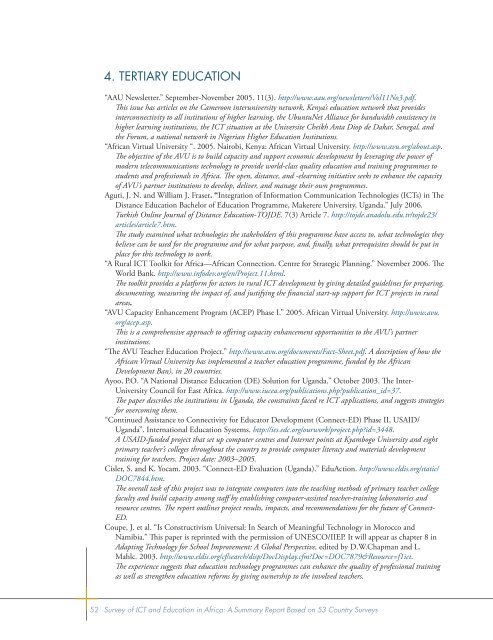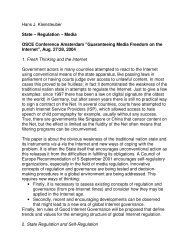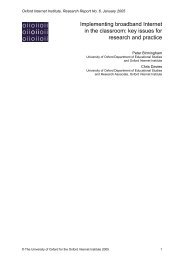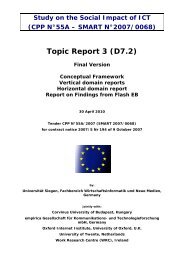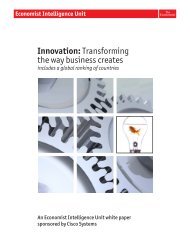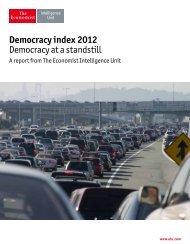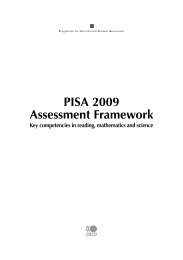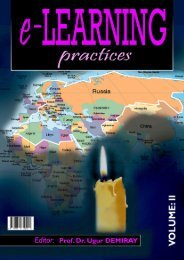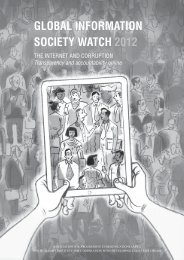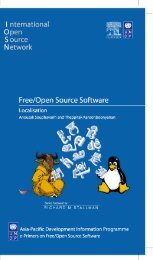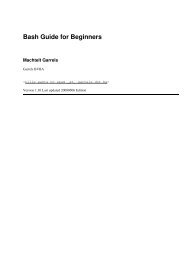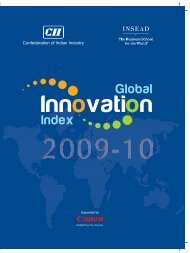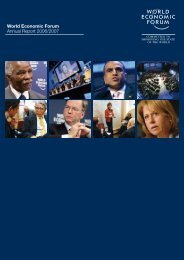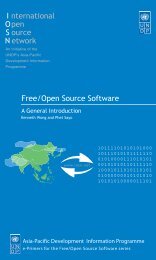“Mkusanyiko on School Networking. SchoolNet Africa.” 2004. SchoolNet Africa www.schoolnetafrica.org/422.0html.A compendium of schoolnet and related projects in operation throughout Africa during 2003/2004.“National Initiatives Concerning the <strong>ICT</strong> and Education/Training—Ghana.” 2000. InFocus Programme onSkills, Knowledge and Employability, International Labour Office. http://www.logos-net.net/ilo/150_base/en/topic_n/t8_gha.htm.An overview of initiatives in Ghana as of 2000.Odhiambo, O. October 31, 2006. “Landlocked country may soon become top <strong>ICT</strong> hub in Africa.” TheDaily Nation. http://www.nationmedia.com/dailynation/nmgcontententry.asp?category_id=39&newsid=84493.All public schools in Rwanda are expected to join the information super-highway by the end of next year.Potter, C. and G. Naidoo. May 2006. “Using Interactive Radio to Enhance Classroom Learning and ReachSchools, Classrooms, Teachers, and Learners.” Distance Education. 27 (1) : 63–86. http://www.ingentaconnect.com/content/routledg/cdie/2006/00000027/00000001/art00005.This article provides a case study of the development of the Open Learning Systems Education Trust’s “Englishin Action” programme in South Africa from 1993 to the end of 2004.SchoolNet South Africa, 2003, 2004, and 2005. “Intel Teach to the Future Evaluation.. www.school.org.za/research/index.html.Successive evaluation reports of the first three yearsof the Intel Teach to the Future programme in South Africa.SchoolNet South Africa. 2002. “Audit of Major Educational <strong>ICT</strong> Projects in South Africa: World EconomicForum Global Digital Divide Initiative.”This audit provides an overview of 34 different projects involved with <strong>ICT</strong>s in education in South AfricaSeifu, S. May 2006. “How Soon Is Too Soon? Introducing Technology in Primary School Classrooms.”http://topics.developmentgateway.org/elearning/rc/filedownload.do?itemId=1075152.A case study reviewing the challenges, rewards, and lessons learned from a two-year project of introducing theconcept of technology to the rural least-privileged schools of Rwanda.“Somali Interactive Radio Instruction Program (SIRIP).” International Education Systems. http://ies.edc.org/ourwork/project.php?id=3734.Building on the success of the previous Interactive Radio Instruction for Somalis, SIRIP has a series ofinteractive radio instruction programmes for students in Grades 1 to 6.South Africa Department of Education. 2002. “Audit of Selected Educational <strong>ICT</strong> Projects in SouthAfrica.”wef-ict-audit-final.doc.A bit dated, but a useful overview of key <strong>ICT</strong>4E projects in the schools sector in South Africa.South Africa Draft <strong>ICT</strong> in Education Implementation Plan. 2006. National Department of Education.The document provides information on the status of access to and use of <strong>ICT</strong>s in South African schools and aproposed strategy to improve access, use and integration in learning and teaching.South African Institute for Distance Education. 2005. “Online Access and Connectivity of Primary SchoolTeachers in Sub-Saharan Africa.” SAIDE, Johannesburg, South Africa. www.saide.org.za/This is a report on desktop research on access to on-line resources by teachers in Africa focusing on Kenya,Nigeria, South Africa, and Tanzania.“State of the Art telecentre in Tunisia.” 2006. telecentre.org. www.telecentre.org/en-tc/node/15674.The Centre National Informartique Pour l’Enfance and the Centre National Informartique Pourl’Handicappe in Tunisia has branches in the 24 governorates of Tunis that allow children access to <strong>ICT</strong>training in multimedia and the Internet.“Timebound Program on Eliminating Child Labor in Tanzania.”. 2002–2006. International EducationSystems (IES). http://ies.edc.org/ourwork/project.php?id=3224&topic=13.A report of an interactive radio instruction series called Mambo Elimu that reached approximately 10,000children in Tanzania who had no access to formal education. A similar project has been conducted in Somalia.World Links. 2006. “Global Report 2006. www.world-links.org/images/stories/Documents/global%20report.pdf. World Bank, Washington, USA.This report assesses the work of the World Links programme during the eight-year period leading up to 2006. Ithighlights a few case studies in Africa.www.infodev.org ANNEX 2: A Selected Bibliography of <strong>ICT</strong> in Education in Africa 51
4. Tertiary Education“AAU Newsletter.” September-November 2005. 11(3). http://www.aau.org/newsletters/Vol11No3.pdf.This issue has articles on the Cameroon interuniversity network, Kenya’s education network that providesinterconnectivity to all institutions of higher learning, the UbuntuNet Alliance for bandwidth consistency inhigher learning institutions, the <strong>ICT</strong> situation at the Universite Cheikh Anta Diop de Dakar, Senegal, andthe Forum, a national network in Nigerian Higher Education Institutions.“African Virtual University “. 2005. Nairobi, Kenya: African Virtual University. http://www.avu.org/about.asp.The objective of the AVU is to build capacity and support economic development by leveraging the power ofmodern telecommunications technology to provide world-class quality education and training programmes tostudents and professionals in Africa. The open, distance, and -elearning initiative seeks to enhance the capacityof AVU’s partner institutions to develop, deliver, and manage their own programmes.Aguti, J. N. and William J. Fraser. “Integration of Information Communication Technologies (<strong>ICT</strong>s) in TheDistance Education Bachelor of Education Programme, Makerere University, Uganda.” July 2006.Turkish Online Journal of Distance Education-TOJDE. 7(3) Article 7. http://tojde.anadolu.edu.tr/tojde23/articles/article7.htm.The study examined what technologies the stakeholders of this programme have access to, what technologies theybelieve can be used for the programme and for what purpose, and, finally, what prerequisites should be put inplace for this technology to work.“A Rural <strong>ICT</strong> Toolkit for Africa—African Connection. Centre for Strategic Planning.” November 2006. TheWorld Bank. http://www.infodev.org/en/Project.11.html.The toolkit provides a platform for actors in rural <strong>ICT</strong> development by giving detailed guidelines for preparing,documenting, measuring the impact of, and justifying the financial start-up support for <strong>ICT</strong> projects in ruralareas.“AVU Capacity Enhancement Program (ACEP) Phase I.” 2005. African Virtual University. http://www.avu.org/acep.asp.This is a comprehensive approach to offering capacity enhancement opportunities to the AVU’s partnerinstitutions.“The AVU Teacher Education Project.” http://www.avu.org/documents/Fact-Sheet.pdf. A description of how theAfrican Virtual University has implemented a teacher education programme, funded by the AfricanDevelopment Ban), in 20 countries.Ayoo, P.O. “A National Distance Education (DE) Solution for Uganda.” October 2003. The Inter-University Council for East Africa. http://www.iucea.org/publications.php?publication_id=37.The paper describes the institutions in Uganda, the constraints faced re <strong>ICT</strong> applications, and suggests strategiesfor overcoming them.“Continued Assistance to Connectivity for Educator Development (Connect-ED) Phase II, USAID/Uganda”. International Education Systems. http://ies.edc.org/ourwork/project.php?id=3448.A USAID-funded project that set up computer centres and Internet points at Kyambogo University and eightprimary teacher’s colleges throughout the country to provide computer literacy and materials developmenttraining for teachers. Project date: 2003–2005.Cisler, S. and K. Yocam. 2003. “Connect-ED Evaluation (Uganda).” EduAction. http://www.eldis.org/static/DOC7844.htm.The overall task of this project was to integrate computers into the teaching methods of primary teacher collegefaculty and build capacity among staff by establishing computer-assisted teacher-training laboratories andresource centres. The report outlines project results, impacts, and recommendations for the future of Connect-ED.Coupe, J. et al. “Is Constructivism Universal: In Search of Meaningful Technology in Morocco andNamibia.” This paper is reprinted with the permission of UNESCO/IIEP. It will appear as chapter 8 inAdapting Technology for School Improvement: A Global Perspective, edited by D.W.Chapman and L.Mahlc. 2003. http://www.eldis.org/cf/search/disp/DocDisplay.cfm?Doc=DOC7879&Resource=f1ict.The experience suggests that education technology programmes can enhance the quality of professional trainingas well as strengthen education reforms by giving ownership to the involved teachers.52Survey of <strong>ICT</strong> and Education in Africa: A Summary Report Based on 53 Country Surveys
- Page 1:
+ MAINSTREAMING ICT and Education S
- Page 5 and 6:
Infrastructure in Schools 11Infrast
- Page 7 and 8:
larger, on-going, systematic, coord
- Page 10 and 11:
Project BackgroundOverviewThis repo
- Page 12:
Mary Mmayi, Philip Ouma Ayoo; Dlang
- Page 16 and 17: DANTE (Delivery of Advanced Network
- Page 21 and 22: nnnnand South Africa, have mechanis
- Page 23 and 24: countries. In addition, a very limi
- Page 25 and 26: nMauritius uses a fleet of “cyber
- Page 27 and 28: nnnnnnInstitutional policy developm
- Page 30 and 31: ICT Activities and Initiativesin Pr
- Page 32 and 33: nnnnnnsourced second-hand and refur
- Page 34 and 35: use of ICTs in teaching and learnin
- Page 36 and 37: ICT Activities and Initiativesin No
- Page 38 and 39: Gender Equity and ICTin EducationGe
- Page 40 and 41: Factors Enabling andCONSTRAINING IC
- Page 42 and 43: ICT in Education inAFRICA: A Way Fo
- Page 44 and 45: Notes1. Steiner, R., T. Nyaska, M.
- Page 46 and 47: ANNEXESwww.infodev.org Notes 33
- Page 48 and 49: ANNEX 1:Regional ICT in EducationIn
- Page 50 and 51: prises in Africa and the developing
- Page 52 and 53: LinuxChix Africa | www.africalinuxc
- Page 54: Headquartered in the US, the WCE so
- Page 57 and 58: This book chronicles and analyses t
- Page 59 and 60: “Mozambique ICT4D National Policy
- Page 61 and 62: 3. Primary and Secondary EducationA
- Page 63: “Intel Gives Nigerian Students Ac
- Page 67 and 68: www.aau.org/wghe/publications/wghe_
- Page 69 and 70: An EDC pilot project to build the c
- Page 71: COUNTRIES/AFRICAEXT/EXTAFRREGTOPEDU
- Page 74: SURVEY OF ICT AND EDUCATION IN AFRI


